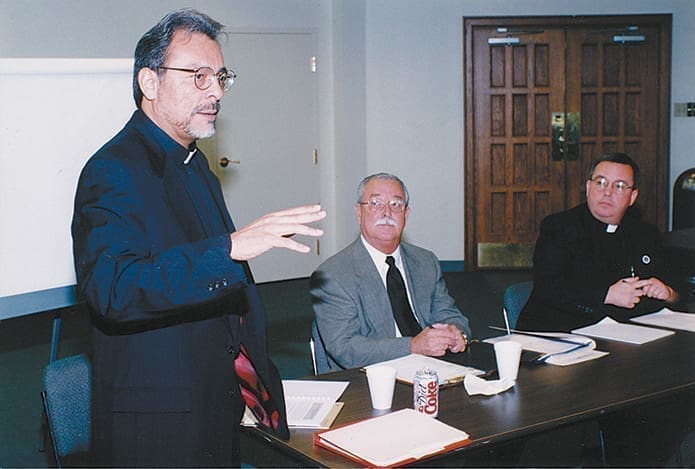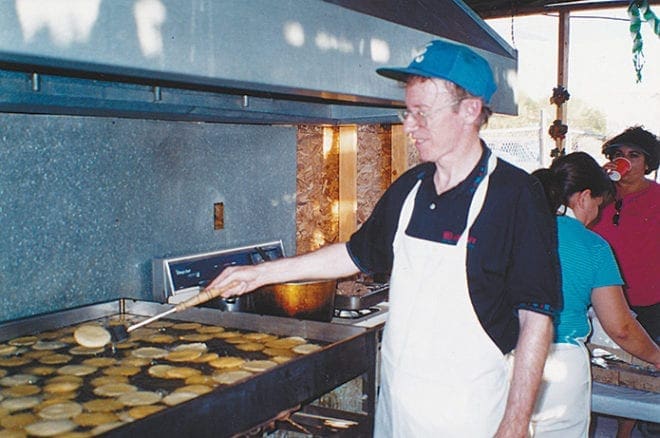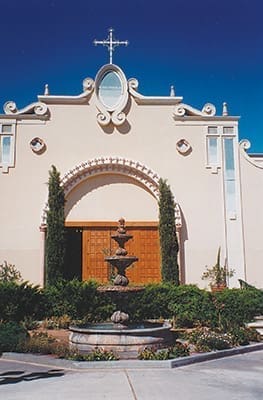 Photo by Michael Alexander
Photo by Michael AlexanderAtlanta
El Paso Project Gave Push To Be Welcoming Church
By GRETCHEN KEISER, Staff Writer | Published April 11, 2013
ATLANTA—They are pastors now, but 12 years ago, they were seminarians, accepted as candidates for the Atlanta priesthood by Father David P. Talley, vocations director, and schooled during the summer in a Spanish language and cultural immersion program on the Texas-Mexican border he fostered.

Father Neil Herlihy, then a seminarian, fries gorditas for a parish festival at Santa Lucia Church in El Paso in the summer of 2001. He has initiated Mass in Spanish in The Rock, Ga., where he is pastor. Photo By Priscilla Greear
Father John Matejek, pastor of St. Catherine of Siena Church, Kennesaw, spent several weeks in El Paso, Texas, in the summer of 2001. A native of Chicago, he was familiar with ethnic parishes there and belonged to one, but he said the weeks he spent in Texas and Mexico that summer have made a positive impact on how he ministers as a priest. For one thing, the group made a pilgrimage to the Basilica of Our Lady of Guadalupe, “which I probably would never have had the chance to do.”
“The El Paso Project helped me a lot. I have always been a person who believed in the universality of the church, (that) different traditions and customs help strengthen the church,” Father Matejek said.
But he was not familiar with the culture of Catholics living on the border or with the culture of Mexican Catholics. Trips to Juarez, Mexico, classes on inculturation, and the Spanish language benefitted him, he said.
“It gave me an opportunity to see how important traditions are and how a lot of their traditions are incorporated into the celebration of the holy Mass and celebrations of the sacraments,” he said.
Over 500 people come to Mass in Spanish each Sunday at St. Catherine of Siena Church, he said.
He credits the building up of the community to Father Manuel de Jesus Rivas, parochial vicar, and Bishop Luis Zarama. He said he can celebrate Mass and the sacrament of reconciliation in Spanish, but “every time I do that I have to spend a lot of time preparing.”
What really stayed with him was how welcoming people were to him when he was the newcomer on the border, who didn’t know the language or the traditions.
“The welcoming we got as Anglos, so to speak, to their culture is something I always remembered as what I would want to offer to people from another culture in my parish. It was a very strong welcome,” he said.
He has made an effort to replicate in the Kennesaw parish a truly welcoming spirit, he said.
“I am very happy and very grateful for what I see here. Too often I think Hispanic Catholics have felt like second-class Catholics. There is no such thing as second-class Catholics in this parish,” Father Matejek said.

St. Pius X Church in El Paso, Texas, is pictured. It is one of the churches where Atlanta seminarians spent time during the summer of 2001 to learn the Spanish language and cultural differences among Catholics on both sides of the border. Photo By Priscilla Greear
The El Paso Project lasted for several years while Father Talley was vocations director. A priest of the Atlanta Archdiocese, initially Msgr. Frank Giusta and later Father Paul Williams, was assigned as pastor of an El Paso parish and received rotating groups of seminarians for language training and immersion in the culture. The hope was to prepare the seminarians, who came from a wide variety of backgrounds, to minister to Catholics, who were coming from all parts of the world to Atlanta.
“Some people have that gift of farsightedness. I think maybe Talley is one of the few who have that gift,” Father Matejek said. “It is a perfect example of why Talley is such a good candidate for bishop. He already saw it coming down the road. … That may be one of the reasons he was tapped.”
The vocations director was the one who gave Father Matejek the news he’d been accepted as a seminarian, “and I have been very good friends with him ever since.”
“I am very delighted to see him as a bishop, very delighted. He has the people skills, not only with lay people but with the priests and the presbyterate and the deacons. He has a very good insight into the diaconate. I know a lot of the good things he has done and suggested,” Father Matejek said.
“He is a very good listener. When he would come to the seminary, he would sit down with all of us and say, what is going on with your life, good, bad and indifferent. All of us felt he had an ear to the ground with us, no matter how important or unimportant it was. …. That’s important for the presbyterate: to be able to talk to their bishop.”
Father Neil Herlihy, pastor of St. Peter the Rock Church, The Rock, was a part of the 2001 immersion group as a seminarian.
“The experience for me on the whole was a very good one,” Father Herlihy said. “We spent about five weeks in a language school and we focused on conversational Spanish, trying to learn how to communicate with other people and not worrying too much about grammar.”
“We spent about 10 days traveling through Mexico to learn about the culture and to practice using the language. I thought that was a very good dimension to the project,” said the priest, who grew up in the Bronx, New York.
“It helped me in my current ministry now,” Father Herlihy said. “I feel comfortable to celebrate Mass in Spanish and to welcome people into the community.”
About two years ago, he started offering a Sunday Mass in Spanish because people were traveling about an hour to the nearest church offering a Spanish Mass, which was in Griffin. Father Dennis Juan, pastor in Griffin, worked with him to start the Mass in The Rock.
“I was able to put the experience to use many years later in my ministry,” he said. “It has been very helpful to me in being able to celebrate Mass and make people feel welcome into the community.”
“Now we make the Mass much more accessible,” Father Herlihy said.
“Bishop Talley is a man of vision. He has very good instincts and judgment. … The El Paso Project is just one example of that,” he said.
Like Father Matejek, he has kept in touch with the former vocations director, who helped him be assured of his call to the priesthood.
“He was very helpful to me and very supportive of me. I was a later vocation, as was he. He could relate to my experience. It was very reassuring and very encouraging. He has been very helpful to me throughout my priesthood,” Father Herlihy said.
“When I was in my discernment process I had to leave to go back to New York to take care of my father who was actively dying. He said, go, do what you have to do, that is more important. I was back and forth for three years. I kept in touch with him. He knew exactly how best to approach my entrance to seminary because of his pastoral approach. He still kids me now. He says, I kept tabs on you and knew when you were ready. He sensed that what I went through was helpful in my discernment process.”
While the new bishop has a wide range of experiences as a pastor, as a vocations director, as a judicial vicar and canon lawyer, “In his heart, he is, in essence, a pastor.”
“He is very popular among the priests. The priests like him and respect him, too. They know he is a pastor at heart.”
Father Eric Hill took part in the El Paso Project in 1999, part of the first group from the archdiocese sent there. With Msgr. Giusta as pastor there “there were many opportunities to be exposed to the culture of the area and the language,” he wrote.
“David Talley was a wonderful asset and morale booster for us; (it was not easy to be in West Texas in the summer),” Father Hill wrote by email.
“He has a wonderful heart and I am so happy to see him being called to be a bishop. I know that he will bring great joy to the archdiocese and the people as well,” Father Hill wrote.